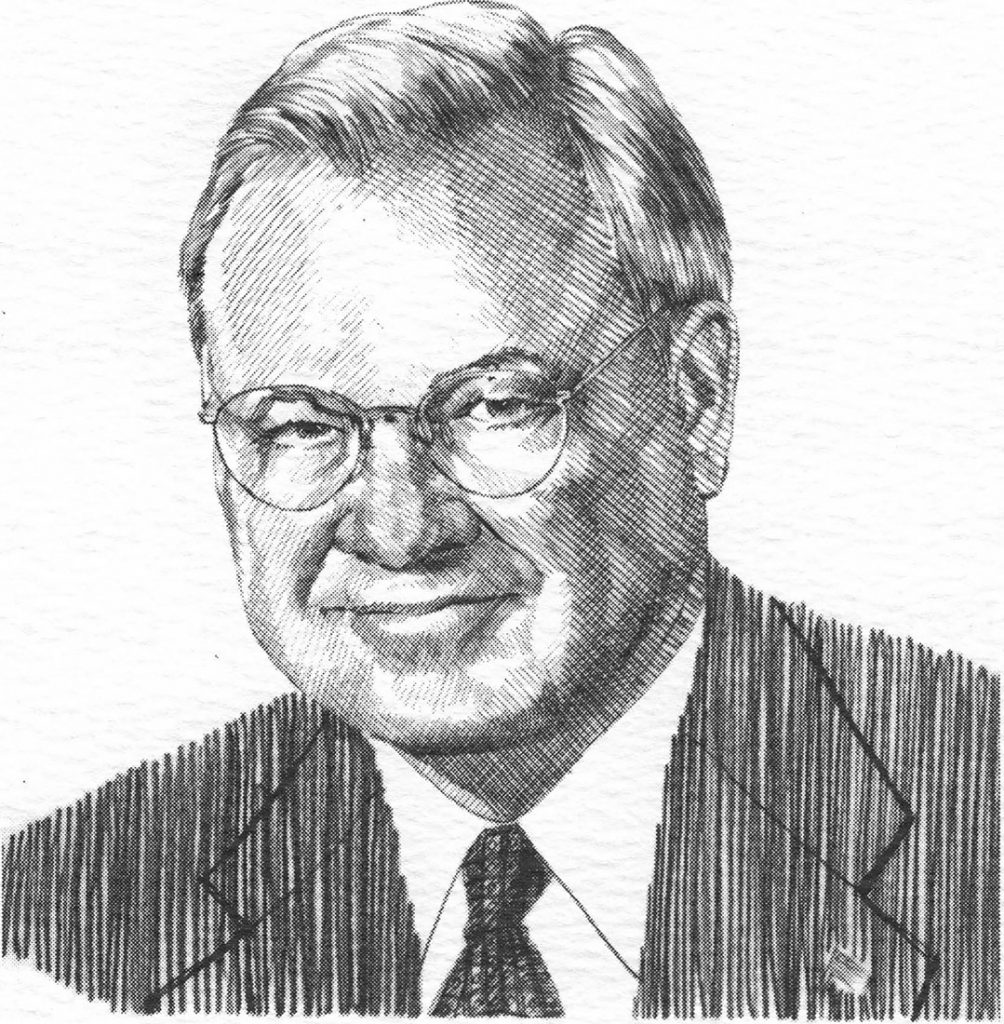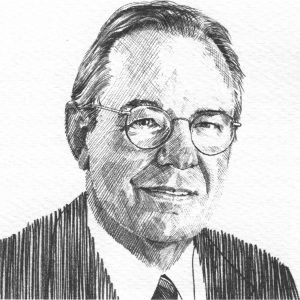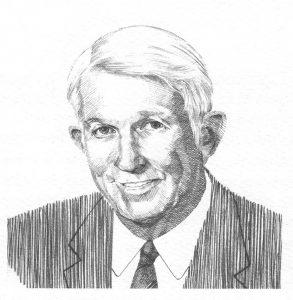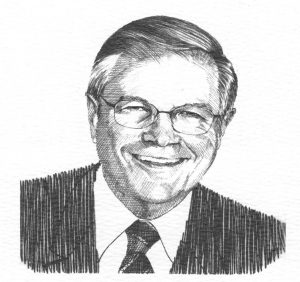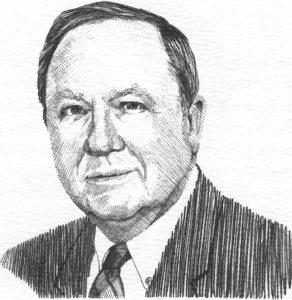The “Can-Do” motto of the Sea bees best summarizes the philosophy of Miller Gorrie, who served for three years in the Civil Engineering Corps of the U.S. Navy after graduating from Auburn. Gorrie never forgot the positive Seabees attitude and made it one of the cornerstones of his life and his business.
Gorrie was born in Birmingham on October 20, 1935, to Magnus James “M.J.” and Margaret Miller Gorrie. His father’s family emigrated from Scotland to Montgomery soon after the Civil War. His mother was the daughter of Dr. Walter Taylor Miller, a DeKalb County physician. Miller Gorrie and his father, an electrical engineer, often spent time together, and when Gorrie was about 14, they decided to build a small cabin on the family farm near Trussville. This project ignited Miller’s interest in construction as a career.
Gorrie grew up in the suburbs of Birmingham until 1943 when IBM transferred his father to New York. After returning to Birmingham three years later, he attended Lakeview Grammar School and Ramsay High School and was graduated from Shades Valley High School in 1953. Starting with a paper route and later summer construction jobs, Gorrie began working and saving money, investing it all in IBM stock. Over the years this stock multiplied in value and became the nest egg that financed his business a decade later.
As a senior in high school, Gorrie was awarded an N.R.O.T.C. scholarship and he chose Auburn, enrolling in 1953 as a civil engineering student. He became a member and later president of the Sigma Nu fraternity. At Auburn, he met Frances Greene of Troy, and they were married following his graduation in 1957. Gorrie has often said that the best decision he ever made was to marry Frances.
After Gorrie was discharged from the navy in 1960, he returned home and began working with Daniel Construction Company as a quantity surveyor and entry-level estimator. Two years later, he joined Rust Engineering but was not challenged by taking preliminary drawings and making cost estimates for the design department. After a year, he accepted a job at J. F. Holley, a much smaller company but one where he would have broader responsibilities, including project management.
In 1964, Gorrie purchased the construction assets of Thomas C. Brasfield, who began a small construction company in Birmingham in 1921. For three years, Gorrie operated the company under the name of Thomas C. Brasfield, but in 1967 he decided to change the name. By this time Gorrie was so identified with the company that he could have dropped the Brasfield name, but Mr. Brasfield was still alive, and Gorrie believed the name meant something to him and his family, although Tom Brasfield was never directly associated with the company. The new name became Brasfield & Gorrie.
The company grew steadily through the 1960s, constructing small office buildings, schools, churches, industrial plants, and hospitals. In early 1970, Gorrie ventured into building apartments, a move that proved disastrous and almost broke the company. Through hard work and the dedicated loyalty of his associates, he was able to prevent a total collapse and used the lessons learned to strengthen his company. In 1977, Gorrie moved his company into wastewater and water treatment work. The first years were not successful or profitable, but he persevered, and this work is now very important to the company.
In the early 1980s, fueled by reconstruction needs after Hurricane Frederick, Brasfield & Gorrie became heavily involved in the construction boom that came to the Alabama Gulf Coast and the Florida Panhandle, completing over 40 projects. Condominium construction pushed Brasfield & Gorrie to another level. The volume of work allowed the company to expand and develop a large number of experienced superintendents and foremen.
As work on the Gulf Coast dried up, Gorrie expanded the company into new geographical markets. He established offices in Orlando and Atlanta and guided the company through a restructuring process that decentralized the company into divisions and assigned sales and marketing responsibilities to division managers. Rapid growth resulted. The Orlando office gained local recognition when it built the Orlando City Hall. The Atlanta presence was strengthened by the completion of the concrete frame for the Georgia Dome, which involved pouring 50,000 cubic yards of elevated, formed concrete in less than eleven months.
Brasfield & Gorrie’s retail presence grew substantially after landing the Parisian account. The Parisian Galleria store was the first of 26 Brasfield & Gorrie built across the South and Midwest. In 1997, the company expanded by opening offices in Raleigh and Nashville and organized an industrial division to concentrate on that construction discipline. This year B&G was recognized for its role in reconstructing a bridge in downtown Birmingham at the 1-65, 1-20/59 interchange, completing it in 37 days after the bridge was damaged by fire.
From annual revenues of $800,000 in 1964, Gorrie led Brasfield & Gorrie to become a company in 2001 with annual revenues approaching one billion dollars and 2000 employees servicing clients in 15 states. B&G has been consistently recognized by Engineering News Record as one of the nation’s top domestic general building contractors, currently ranking 24th in the U.S. Between 1998 and 2002 Modern Healthcare magazine named Brasfield & Gorrie as the largest general contractor in healthcare in the country for three years and the second largest for the other two years.
Miller Gorrie is known as a man of few, words, a quiet, humble man who never draws, attention to himself. But when he does speak, his words are powerful and respected. Because he is so soft-spoken and one must concentrate to hear his voice, he was once called “Silent Thunder.” Miller and Frances Gorrie have three children: Ellen Gorrie Byrd, Magnus James Gorrie II (married to Alison), and John Miller Gorrie, and five grandchildren, Frances Ellen, Ginny, and William Byrd, and Magnus Miller II (Mills) and Alie B. Gorrie.
Gorrie currently is on the board of directors of Colonial Properties Trust and ACIPCO and formerly served on the boards of AmSouth Bank and Winsloew Furniture. Professionally, Gorrie was on the board and was president of the Associated General Contractors. He has also served on the boards of the Business Council of Alabama, the Birmingham Chamber of Commerce, the Metropolitan Development Board, and the Economic Development Partnership of Alabama.
An active supporter of many charitable civic and educational institutions, Gorrie has served on boards of the United Way and Alabama Symphony, as well as the Medical Center East, Baptist Medical Centers, and McWane Center foundations. He served on the Auburn Building Science Advisory board, the UAB Civil Engineering Board of Visitors, the UAB President’s Council, and the Samford University Board of Overseers. He and France founded a school in Atlanta to serve children with learning disabilities, and Gorrie serves as chairman of the board.
Gorrie was inducted into the Alabama Engineering Hall of Fame in 1997 and was awarded the Cornerstone Award by the Association of Builders and Contractors for Lifetime Achievement in the Construction Industry in 1998. He has recently been honored by the naming of the M. Miller Gorrie Construction Center to be built on the Auburn University campus being made possible by a lead gift from Brasfield & Gorrie employees.

